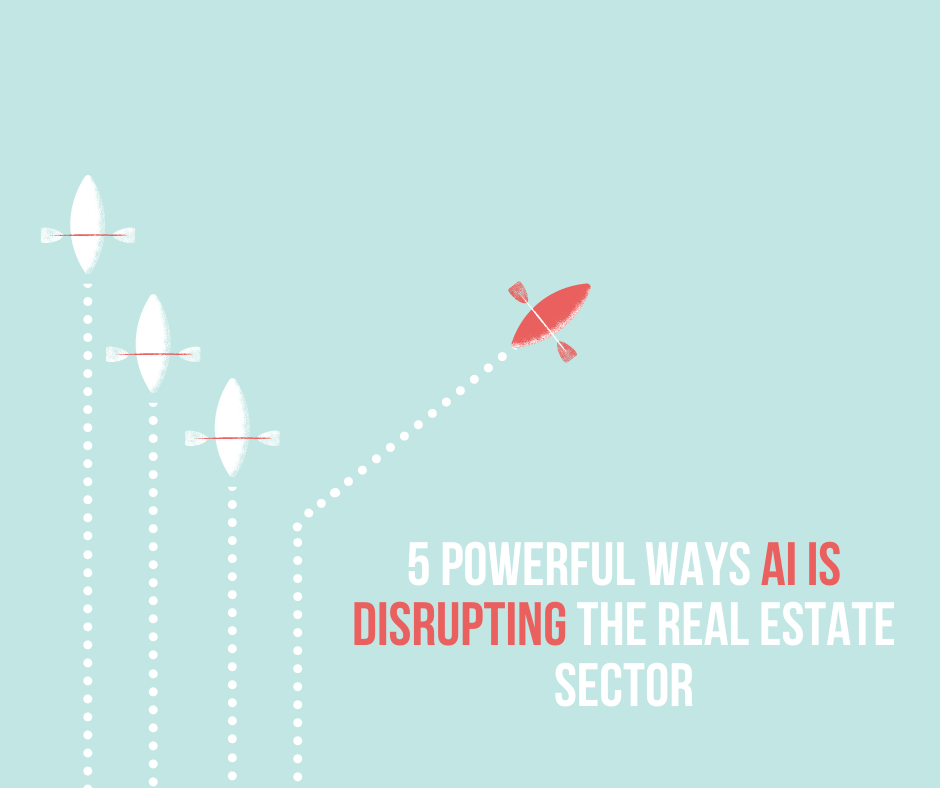5 Powerful Ways AI Is Disrupting the Real Estate Sector
30 September 2020 | 4 min read

AI is set to be one of the most, if not the most, disrupting technologies the world has ever seen. We’ve already seen that data-driven companies experience higher profits, cultivate better customer experiences, generate increased customer loyalty levels, eliminate errors, and increase efficiency and productivity. Put simply, unlocking the insights hidden within your data benefits businesses and customers alike.
The forward-thinking companies leading the AI revolution are already experiencing these benefits, but the rest of the world is starting to wake up too. Gartner’s study found that 37% of organizations have already begun to adopt AI into their operations. Furthermore, with AI predicted to contribute over $15 trillion to the global economy by 2030, we can expect the number of companies utilizing AI to increase exponentially .
So, where does this leave the real estate industry? Real estate is primed to be a significant part of the AI revolution. As a traditional industry, it’s plagued with poor data management practices and convoluted processes. But this is all starting to change. The online real estate sector generates and gathers vast amounts of data, all of which can improve customer experiences and promote sales. Here we’re going to focus on the specific ways AI is disrupting the real estate sector and how real estate companies can best leverage AI.
The AI Revolution Is Already Here
We often think of significant technological advancements as things that are too big to miss. If you live in a world without jetpacks and suddenly you wake up, and everyone is flying to work with a jetpack, then you’d rightly be floored. This is how movies like to portray technological advancement. Of course, this makes sense in movies, because the feeling of awe you experience comes directly from the contrast of “have” and “have not.” Technological advancement can be just as impressive and earth-shattering in the real world, but it happens steadily, so we often miss it.
You’re already experiencing AI in action in your daily life. Every time you watch a show that Netflix has recommended to you or bought a product based on an Amazon recommendation, you’ve flirted with AI. AI has been a significant focus for entertainment companies because they only make money if you keep watching, so it’s in their best interest to recommend things that you want to watch. This simple philosophy isn’t just for entertainment but can be rolled out across all industries. And this is precisely what we see today.
For example, let’s consider how this philosophy applies to AI in real estate. With property AI, users browsing the real estate website will only see search results relevant to their wants and needs. If a user wants a new home or a fully refurbished home, then there’s little use showing them search results that include new homes with outdated or non-functioning bathrooms and kitchens.
Conversely, a property developer looking to maximize their profit on a house flip isn’t interested in fully furnished new builds on the market close to the ceiling price. Failing to utilize artificial intelligence in real estate in this way can lead to frustrating experiences for users. Many users will abandon their search altogether and go in a different direction. The key to successful AI real estate is to harness the power hidden within the data and use these insights to direct change in specific areas. What are these areas? That’s what we’re diving into next. Let’s take a look.

5 Powerful Ways AI Is Disrupting the Real Estate Sector
1. Investment Analysis and Predicting Market Value
A survey of 400 senior executives in commercial real estate aimed to determine how AI and machine learning are being used today in the sector. The results were promising. At present, automation is much more common than more advanced types of AI or machine learning. This isn’t too surprising since automation is relatively easy to implement but typically sports a high ROI (fewer errors mean improved efficiency and reduction in human labor helps save costs). However, AI is starting to be implemented in more advanced ways across different real estate sub-branches, with “Scenario and Sensitivity Analysis” is the most common application. This type of analysis focuses on analyzing a property’s financial and operational performance to make informed and profitable investment decisions.
Data analysis can lead to all sorts of surprising discoveries that we would otherwise miss. For example, did you know the name of a street can impact house prices? A study found that “street” is the least expensive address suffix by the square foot, while “boulevard” is the most costly. If you live at number 13, generally considered an unlucky number by superstitious people, this can also harm your house price. What about trees? You perhaps can already guess that having trees is a good thing for your property, but the age of trees also matters. In a world where property developers often cut down trees to make room for new homes, having an old tree can enhance your property value. Crown moldings can also boost your property value. Crown moldings are standard in buildings with high ceilings, and everyone loves high ceilings. But it turns out that just having crown moldings can boost your property price even without the high ceilings. It’s all about perception.
Discoveries like these may seem insignificant on a small scale, but they can lead to considerable investment opportunities when they accumulate. As AI in real estate advances, we expect to see more discoveries like this that help realtors and investors work together. It’s conceivable that we’ll see these algorithms meshed with investor preferences on real estate websites in the next few years. Websites will recommend the most beneficial properties to investors based on house number, location, the age of trees, and many more factors.

2. Lead Generation and Marketing
The eCommerce industry is already leading the way in this use of AI in business, but real estate companies are starting to see it’s disrupting potential. Chatbots and machine learning interfaces can help improve lead generation and content marketing by streamlining communication and delivering the right content at the right time. For example, let’s say you want to target 25-35-year-old professionals for new build homes in a highly sought after area. Most real estate companies might run an ad on Facebook that will drive traffic to their website’s property listing. However, by more heavily utilizing AI in real estate, you can take it a step further and get better results.
Instead of driving potential leads to your website, you can design the ad so that when the lead clicks on it, they are taken to an AI chatbot in Facebook Messenger. This is beneficial for several reasons. Firstly, the user becomes automatically subscribed to the chatbots newsletter, so you can maintain contact without hitting them with excessive requests for their personal information like their email address. Secondly, the chatbot can answer questions immediately, eliminating the need for the user to contact the sales or marketing team and wait for an answer. People will often dismiss an option if they are unsure about something, and getting the answer requires effort on their part. Chatbots are hyper convenient and therefore eliminate this issue. Lastly, chatbots offer a personalized experience, which is now a must for modern buyers.
Chatbots can be designed to ask key questions to offer a more personalized experience to the user and come back instantly with relevant listings. For example, they might ask the user what their price range is, whether they want to buy/rent/sell, and what area they want to live.

3. Advanced Property Analysis
One area of AI real estate that is seeing a lot of activity is advanced property analysis. Potential buyers often have many requests for a new property that go beyond “two-bedroom house with garage,” or “three-between house with outdoor space.” With AI algorithms, we can analyze properties in extreme detail and use this information to tell customers more about the properties they are interested in. For example, AI software can:
- Determine the quality of nearby schools.
- Analyze how much sunlight enters the house at certain times of the day.
- Provide information about the local public transportation system, including what is available as well as frequency.
- Whether parking is available nearby and how much it costs.
- How resilient the home is to noise, as well as the possible sources of sound disturbance in the area.
AI algorithms can also be used to analyze photos of properties that real estate websites are already using. For example, with image detection and computer vision software, key details can be found in photographs such as:
- New kitchens and bathrooms. These are often highly sought after by buyers.
- Natural light and window placement.
- Functioning fireplaces.
- The amount of outdoor space.
- The presence of hardwood floors.
This information is often not included in the metadata and, therefore, isn’t utilized despite its impact. Some buyers are sure about what they want and have no intention of budging. Let’s say a potential buyer only wants to look at homes with fireplaces or hardwood floors; they could miss potentially 100s of properties that are suitable simply because this information wasn’t included in the metadata on the website. Computer visions and image detection uses AI to bridge this gap.

4. Preference Based Recommendations
Netflix or Amazon but for real estate. Using historical and real-time behavioral data, real estate websites can determine what customers want and deliver highly personalized experiences. For example, real estate websites can create customer profiles or buyer personas through AI. With AI algorithms, most of this happens behind the scenes with little to no human intervention. Customers may be shown search results based on their previous search terms, how long they viewed a listing or past purchases.
We’ve already seen preference-based AI algorithms be hugely successful in the entertainment industry. While Netflix is the most well-known example, some companies have taken this much further. On Netflix, you get a mixture of preference-based recommendations and regular recommendations (The Top 10 Most Watched in Your Country Today). However, TikTok works almost entirely off preferences. Users are pushed content based on several factors, including whether they like a video, how long they spend looking at it, whether they watch it more than once, whether they share it, comment on it, and so on. It learns what you like and only gives you what you want. We expect to see algorithms like these become more widespread in the online real estate sector.

5. Property Management and Maintenance
The property management industry is growing fast, and therefore maintaining technological relevance is a must. Last year, the industry grew to $73 million in the US as rental demand surged. Despite its rapid growth, the sector is still battling with inefficiencies and antiquated practices. AI is primed to disrupt the way property management is handled.
Property managers have to track tenant applications, rental listings, maintenance requests, inspections, finances, and more, every day. This can be a daunting process if the list gets out of hand, and things often get missed. But with AI, property managers can get ahead of problems before they occur. For example, analysis of certain operations within the property can alert the property manager when something is likely to need repairs or routine maintenance. For instance, if the water heater has been used for X amount of months without service.
Online AI algorithms can also be used to find optimal tenants for a property. With customer profiles, preference data, and historical data, an algorithm could determine that someone is an optimal tenant based on:
- The houses they have rented in the past (quality, area, amenities, local attractions). If the new property is similar to where they used to live, but only with more attractive qualities they like, this could be a good match.
- Search terms (are like looking for a property like this?).
- Profession (are they likely to stay in this area for work, or is their job likely to relocate?).
Finding optimal tenants helps cut down on vacancy times and ensures that people stay in properties for a longer period.

Conclusion
AI is already massively disrupting the real estate sector, but this is only the beginning. As a traditional industry that is slow to adopt technological advancements, real estate is still in the infant stages of its AI journey. As AI continues to reach new heights, there will be many more exciting things to come for the sector.
If you’re ready to set foot in one of these technologies and start providing better customer experiences, increase your conversions, and get ahead of your competitors, then we’re here to help. Reach out to us to get a free 30 min call with one of our experts and learn more about the possibilities of real estate technology. Contact us today.

AI and personalization made easy
Schedule your call today!


How House Alerts Help To Obtain Higher Click-Through Rates
Thanks to house alert systems, you can quickly inform potential buyers when new properties that match their criteria show up. Here is a step-by-step guide that will show you how you can retarget potential customers and help them find the house of their dreams.
Two Unique Dashboards That Will Help Your Real Estate Agents Close More Deals
Being successful in sales is about knowing your product inside out and knowing everything there is to know about your customer. Luckily, it’s easier to achieve these two goals today than ever before by using some unique dashboards. Read everything about it here:
How Artificial Intelligence is Shaping the Online Real Estate Market
Now in 2021, the message is clear; AI is here, and it’s here to stay. But what impact does this technology have on the real estate market? Read everything about it in this article



